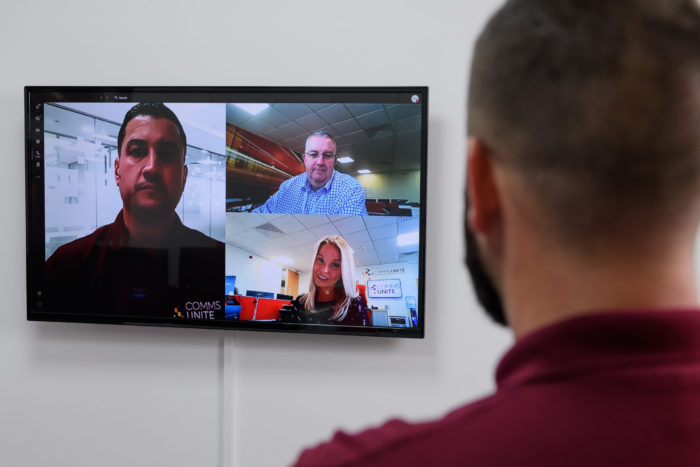
Is your Business Digital Enough?
Businesses in the UK have had to adapt to a brand new way of working, and for many this has meant investing in new technology. While digital solutions are second nature for many organisations, there are those that may have been reluctant to embrace full-scale digital transformation until a sudden change of circumstance made it nothing short of essential.


What has changed?
Undoubtedly the biggest change that companies have faced is a move to remote working, with millions of employees swapping the office desk for their dining room table. Not only are workers having to get used to a change of scenery, but businesses have had to act quickly to ensure their digital infrastructure is set up to accommodate a remote workforce.
Naturally, the scale of digital transformation has varied according to business needs, industry and workforce size. Beyond the adoption of video conferencing for virtual meetings, other considerations for companies have included cloud storage, filing structures, data security, telephone systems and remote network access, to name but a few.
In some cases, businesses have been able to operate just as efficiently without an office, and with their existing systems. However, for those that are still adapting and in need of advice on how to transition with minimal disruption, here are some key areas to consider.
The secrets to a successful remote business
1. Embrace the cloud
Cloud servers provide businesses with secure access to internal documents, software and confidential data from any location, ensuring employees can continue to operate just as efficiently out of the office.
Until recently, many companies depended on a physical server based on-site, which could only be accessed “locally”. However, a move to remote working has made cloud servers an essential investment for these businesses.
As well as providing remote server access, there are numerous other benefits to making a transition to the cloud. With no hardware issues to worry about, cloud servers offer a more cost-effective option than physical servers, providing a stable, faster and more secure connection.
Cloud servers are also a lot more scalable than physical servers – adding memory and disk space is very easy in comparison, not to mention more affordable. They also create greater efficiencies by giving users shared access to documents and other files, reducing the need to create different versions.
2. Streamlined telecoms
External and internal communication is another challenge faced by companies with remote workforces. Where previously customers could reach a business with a simple phone call, companies have had to explore alternative solutions to ensure clients can continue to make contact without any hitches.
Voice over IP (VoIP) telephone systems are one of the most efficient alternatives to traditional landline services, allowing companies to make and receive calls via the internet, with all employees linked into the system via remote access.
A company may also consider investing in dedicated business smartphones, taking advantage of commercial packages from the UK’s mobile network providers. While this can be a more expensive option than VoIP, it does provide the flexibility of being able to speak to clients while on the move, and is less intrusive than sharing personal phone numbers.
3. Reliable broadband
If the majority of your meetings are being conducted virtually via video conferencing software, you’ll need to ensure your internet connection is fast enough to cope. Ideally you want a meeting to feel as natural as it would be face-to-face, but a slow connection will lead to frustration for both yourself and your client.
So, what is the optimum broadband speed for hosting regular video calls? For one-on-one video calls, a download speed of 5 Mbps (megabytes per second) is recommended, whereas larger video conference calls will require 10 Mbps for an HD quality stream.
You’ll also need to consider whether employees will be sharing their home wifi connection with anyone else. This will also affect call quality and may mean higher speeds are required.
4. Secure infrastructure
As the methods of cyber criminals become evermore sophisticated, you’ll want to ensure your data and IT infrastructure is as secure as it can be when working remotely.
Adopting cloud software is a good place to start, as the majority of storage solutions come with in-built firewalls and data encryption, making it difficult for hackers to gain access to your server. You’ll also feel the benefit of regular automated security updates.
If you haven’t already, you may wish to engage the services of a managed IT company with the expertise to equip your company with all the necessary security software, provide training on cybersecurity best practice and offer 24/7 support in the event of a breach.
Experts in digital transformation
At Comms Unite, we offer a specialist IT and telecoms service to businesses across all sectors. With over 30 years’ experience in digital transformation, we have the expertise and industry knowledge to identify the best solutions for organisations making the move to remote working, from connectivity and cloud software to phone systems and cybersecurity.
Our managed IT and telecoms solutions come with 24/7 monitoring and support as standard, along with the flexibility to scale with your business. This means you can focus on business, safe in the knowledge that your digital infrastructure is in the hands of experts. To find out more about our services or discuss your requirements, please don’t hesitate to get in touch.
Estate Agents
The rise of online estate agencies in recent years is a good example of how traditional businesses can embrace digital solutions to provide a more efficient and cost-effective service to customers, while accommodating remote working for employees.
As the name suggests, online estate agents don’t have a high-street presence and operate almost exclusively online. They tend to offer a more basic service than a traditional estate agent, enabling them to offer lower fees to customers.
‘Online-only’ estate agents require sellers to do most of the work themselves, such as taking photos, creating an advert, conducting viewings, handling buyer enquiries and negotiating offers. More recently, ‘hybrid’ agencies have emerged, employing ‘local property experts’ who can look after enquiries, viewings and offers on a seller’s behalf.
Despite these subtle differences, both online-only and hybrid agencies are underpinned by sophisticated technology and a strong digital infrastructure, with ‘local property experts’ tending to work remotely and attend viewings in a defined geographical area.
As a result of the COVID-19 pandemic, traditional estate agents have introduced virtual viewings for customers. Some have used 3D cameras so house-hunters can enjoy a self-guided tour and take accurate measurements of rooms, while others have carried out live tours of a property via video call.
Efficient customer communication continues to be essential for estate agents, so just like any other company, it pays to ensure your digital infrastructure is well-equipped for video conferencing, secure data storage and a seamless user experience.




